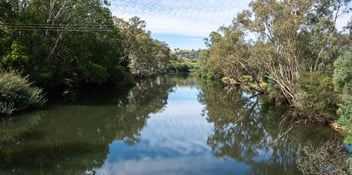MDBA report shows plan aims have “a long way to go”
The Murray-Darling Basin Authority (MDBA) latest progress report reveals that while the Murray-Darling Basin Plan is proving to be effective, there is still a long way to go before the plan’s aims are fully realised.
MDBA Chief Executive Phillip Glyde said the evaluation considered the first five years of the plan’s implementation, taking each element of the plan into consideration to assess whether or not it was on track.
"Already 2108GL of water has been recovered or contracted to be recovered for the environment, and with the expected operation of the Sustainable Diversion Limit Adjustment Mechanism, the water recovery task is likely to be mostly complete," he said.
"Government investments in water savings have been an important component of water recovery that has helped reduce the impact on agricultural industries and communities, and modernise irrigation infrastructure and delivery networks.”
Glyde said that although there has been growth within the agriculture sector, the impacts from water recovery have been harder to manage for some communities, a result which will require more work in future.
"Although the evaluation found that the Basin economy, including the agriculture sector, has continued to grow in the past five years, we know that there are some communities that have felt the impacts of water recovery more than others,” he said.
"The Basin Plan is just one of a number of factors affecting socio-economic outcomes in Basin communities – and we will be undertaking more detailed work to better understand the impacts of the Basin Plan on communities.”
And while the implementation has not been easily received across the board, Glyde said ecological responses to environmental water have been very encouraging.
"This evaluation also found that where we have been able to deliver environmental water, we see positive ecological responses. These are the early signs that we are helping revive the health of the Basin's rivers and floodplains,” he said.
"Environmental water has so far been used in over 750 planned watering events in the past four years, with environmental water holders working together to get water to priority areas at the right time.
"There is clear evidence of positive local-scale environmental outcomes, with positive ecological responses including fish spawning and movement, enhanced bird breeding events and improvements in the health of some areas of native vegetation including river red gum forests.”
Moving forward, the MDBA will be honing in on three key areas for improvement in implementation of the plan.
"We have identified three key areas that need stronger efforts from the MDBA and Basin governments – the development of Water Resource Plans, stronger compliance regimes, and better ways of measuring water take,” Glyde said.
"For our part, the MDBA will be increasing resourcing for assessing Water Resource Plans, and strengthening its compliance functions, including setting up a dedicated Compliance and Enforcement Branch to take a more proactive approach to overseeing compliance across the Basin.
"We urge Basin states to join us in prioritising these important areas of Basin Plan implementation, and to reaffirm their commitment to delivering the Plan in full and on time for the benefit of the Basin and its communities."

